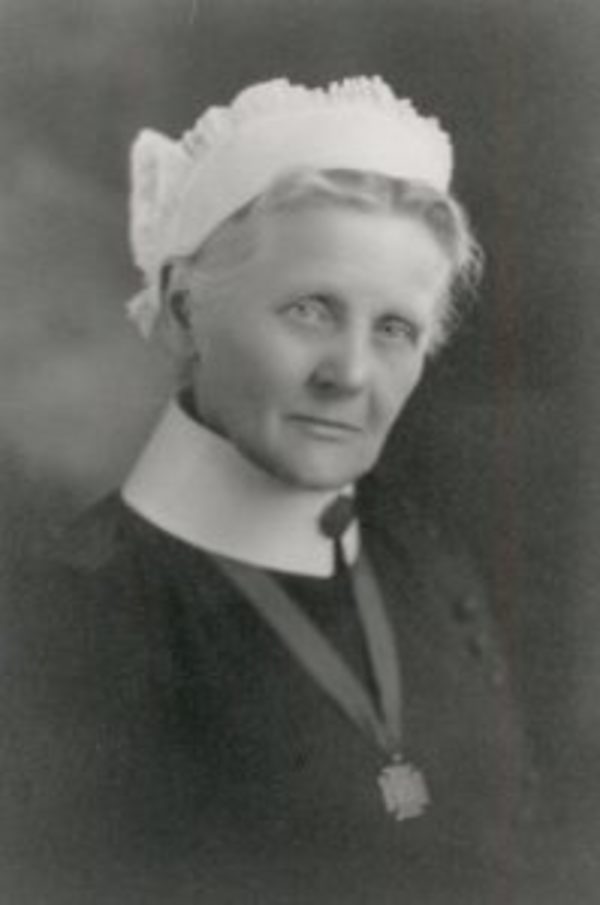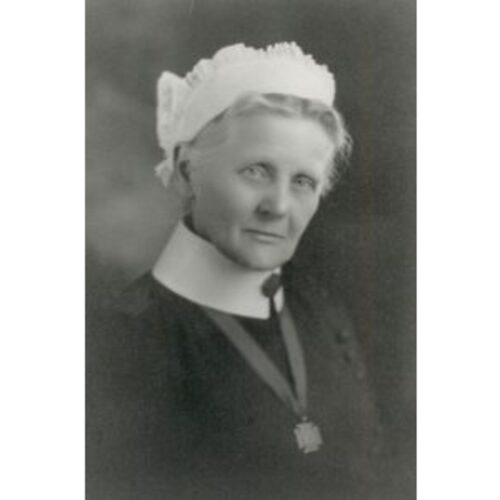
Source: Link
BYRON, FRANCES DALRYMPLE (Redmond), nurse and hospital administrator; b. 1850 in Newry (Northern Ireland), daughter of John Byron; m. 26 Dec. 1868 William Charles Redmond (d. 1930) in Alverstoke, England, and they had a daughter who died in infancy and a son who died in the First World War; d. 14 April 1932 in Vancouver.
Nothing is known of Frances (Fanny) Dalrymple Byron’s early years. She is said to have come from a family whose men had served in the Royal Navy. On the certificate recording her marriage in 1868 to William Charles Redmond, then an assistant naval surgeon, her father is described as a captain. In August 1881 her husband was promoted fleet surgeon, and that October he retired from the navy. Five years later the family immigrated to Canada and initially settled in Winnipeg. Shortly afterwards, probably in 1887, when their 13-year-old son returned to England for his education, Frances and her husband decided to live separately. She wanted to extend her knowledge of nursing. Since there was no school of nursing in Winnipeg at the time, she went to Montreal.
Although sources claim that Redmond studied nursing and midwifery at the Université Laval in Montreal, no women were admitted to that institution during the 19th century. Gertrude Elizabeth (Nora) Livingston* would establish a school for nurses at the Montreal General Hospital only in 1890. However, provincial legislation of 1876 authorized the training of midwives by a physician connected to a maternity hospital and allowed the Provincial Medical Board to grant licences to candidates who passed the required examination. In May 1887 the board nominated three physicians “to examine Mrs W. Redmond who is applying for the licence of midwife.” The result was not recorded. Some sources claim that she also took instruction in order to become a deaconess in the Church of England. Formal courses in Canada began in 1892, however, and it is impossible to confirm that she obtained any training.
Redmond was persuaded to go to Vancouver later in 1887 by Church of England archdeacon Edwyn Sandys Wetmore Pentreath, a family friend in Winnipeg, who knew the Reverend Henry Glynne Fiennes-Clinton, second rector of St James’ Church in Vancouver, with whom she would work closely over the years. Her move may have been a factor in her husband’s decision to set up a medical practice in nearby Victoria during the same period. At that time Vancouver was a frontier sawmill town and port with a population of about 8,500. Sister Frances (she assumed the title Sister, commonly used in Britain by senior nurses) began home nursing on the model of that used by the British district nurse as soon as she arrived, responding to requests from the city’s few physicians that she care for maternity patients as well as those with infectious diseases (typhoid and smallpox) and other illnesses. Medical services in Vancouver were developing slowly. A small seven-bed tent hospital had been set up in 1886 for employees of the Canadian Pacific Railway. It was replaced later that year by a wooden structure, which was soon taken over by the city. In 1888 Vancouver City Hospital, with 35 beds, was built.
That year on 5 March, Sister Frances and Fiennes-Clinton opened St Luke’s Home next to St James’ Church on Oppenheimer (East Cordova) Street. Originally intended as a maternity unit, St Luke’s was soon pressed into service as a general hospital. The original seven-bed facility was expanded, and an operating room was added. A regular advertisement placed by Sister Frances in the Church Record, the monthly newsletter of the diocese of New Westminster, described it as a private hospital and nurses’ home which dealt with medical, surgical, and midwifery cases. Private rooms were offered at $15 a week or nurses could be sent to patients’ residences “at the usual prices.”
The opening of St Luke’s Home necessitated more nurses, who were recruited from England and elsewhere. A nursing school was started in 1888 with one student. Sister Frances and local doctors provided lectures and practical clinical teaching. St Luke’s annual report for 1899 describes her as being in charge of 6 staff nurses and 1 probationer. Nurses visited patients in their homes in Vancouver and in districts nearby, such as Eburne (Richmond) and Marpole (Vancouver), as well as in communities up and down the coast and in the interior as far as Vernon. Sister Frances made one trip to Lytton by stagecoach, sitting uncomfortably on top of a pile of luggage. For a brief period she was matron of a church-sponsored hospital for native people, opened in Vernon in 1893, and she is said to have established hospitals elsewhere in the province.
During a smallpox epidemic in the early 1900s Sister Frances, recognized as an expert by the city health officer, was asked to manage the infectious-disease section at Vancouver City Hospital. Sister Frances and Margaret Clendenning, the hospital’s nursing superintendent from 1899 to 1903, knew each other well and worked together in professional and social organizations. In 1898 they had both served on a committee to establish the city’s branch of the Victorian Order of Nurses for Canada [see Ishbel Maria Marjoribanks]. Other members included Dr William Disbrow Brydone-Jack, Archdeacon Pentreath, Mrs Gavin from the Local Council of Women, and Mrs Catherine Macaulay, a Vancouver philanthropist.
St Luke’s Home became a centre of social activism and nursing leadership. Poverty and social displacement caused by unemployment, alcoholism, or injury were especially prevalent in that part of Vancouver. Sister Frances began a soup kitchen in the basement of Market Hall on Westminster Avenue (Main Street). She offered hospital beds without cost to those in need, and provided space at St Luke’s for meetings, teas, charity events, and wedding receptions for her nurses. A sewing committee met there every Thursday, and a sock committee supplied 1,000 knitted socks for soldiers during the South African War. She and Fiennes-Clinton had excellent organizational skills and both were strong advocates for the poor in their work for bettering the community.
In 1902 a summer camp was set up at Scarborough Beach on Bowen Island for the choirboys of St James and as a site for the parish’s Sunday school picnics. Sister Frances and her husband jointly acquired property on the island that was used as a holiday destination or a place of retreat. Sister Frances sold lunches and offered tentsites to campers, among whom were nurses and local girls who needed respite from their jobs.
Over the years orphaned children brought to St Luke’s because of illness were kept there after they were cured if there was no other place for them to go. Sister Frances raised Luke Bowen and Mark Beach who had both been born at St Luke’s, and she legally adopted Jane Redmond.
From 1897 to about 1906 Sister Frances published a brief column in the Church Record in which she publicized teas and other charity events to raise money for the coffers of both the hospital and the church, thanked individuals for donations, and made appeals to parishioners for specific contributions, such as her request for linen for St Luke’s. She began St Agatha’s Guild, whose members tended the altar at St James. She and other churchwomen gave spiritual lessons through practical achievements, such as collecting donations for the Canadian Patriotic Fund for sick and wounded soldiers and their families during World War I. Her son, Charles Dalrymple Redmond, a rancher, enlisted at age 39 and served overseas in the 16th Infantry Battalion [see Roderick Ogle Bell-Irving*]; he died in battle on 21 May 1915.
Among the many interested in seeing the work done at St Luke’s were charitable businessmen, bishops, church officials, and political figures from Canada, England, Korea, Australia, and Japan. Dignitaries who toured the home included Governor General Lord Aberdeen [Hamilton-Gordon] and Lady Aberdeen [Marjoribanks] on 16 Nov. 1895, Governor General Lord Minto [Elliot*] and Lady Minto [Grey] on 5 Sept. 1900, and, in the late fall of 1910, Lady Mary Hepburn-Stuart-Forbes-Trefusis, née Lady Mary Lygon, lady of the bedchamber to Mary, Princess of Wales.
Formal recognition of Sister Frances’s accomplishments came late in her life. On 13 June 1929 she received Vancouver’s Good Citizen of the Year award, which was presented before a large gathering in Stanley Park. It recognized her care of the sick and needy in Vancouver during the past 40 years. Another tribute that year was the renaming of Keefer Street: Frances Street honoured the contributions of Vancouver’s first public-health nurse. Fanny Dalrymple Redmond died in 1932 after a brief illness.
Anglican Church of Can., Diocese of New Westminster Arch. (Vancouver), St Luke’s Home (Vancouver, B.C.) fonds, 1894–1938. BCA, GR-2951, nos.1930-09-440760, 1932-09-470244. City of Vancouver Arch., AM54, Sister Frances; AM1102, Sister Frances. Collège des Médecins du Québec (Montréal), Bureau provincial de médecine, Procès-verbaux, 1880–90, 11 mai 1887. GRO, Reg. of marriages, Alverstoke, 26 Dec. 1868. LAC, Census returns for the 1911 Canadian census, B.C., dist. Vancouver (12), subdist. 18: 3; R233-37-6, B.C., dist. Burrard (1), subdist. Vancouver (City) (D), div. 18: 12. Mountain View Cemetery (Vancouver), Burial records. National Arch. (G.B.), RG 10, piece 1149, f.48, p.24; RG 11, piece 4757/9, p.12. St James’ Anglican Church Arch. (Vancouver), Sister Frances papers. London Gazette, 6 Sept., 28 Oct. 1881. Vancouver Daily Province, 15 June 1929, 15 April 1932. Church Record (New Westminster, B.C.), 1897–1906. History of public health in B.C., ed. Mark Ewan and John Blatherwick ([Vancouver], 1980). Phyllis Reeve, Every good gift: a history of S. James’, Vancouver 1881–1981 (Vancouver, 1981).
Cite This Article
Helen L. Shore, “BYRON, FRANCES DALRYMPLE (Redmond),” in Dictionary of Canadian Biography, vol. 16, University of Toronto/Université Laval, 2003–, accessed April 12, 2025, https://www.biographi.ca/en/bio/byron_frances_dalrymple_16E.html.
The citation above shows the format for footnotes and endnotes according to the Chicago manual of style (16th edition). Information to be used in other citation formats:
| Permalink: | https://www.biographi.ca/en/bio/byron_frances_dalrymple_16E.html |
| Author of Article: | Helen L. Shore |
| Title of Article: | BYRON, FRANCES DALRYMPLE (Redmond) |
| Publication Name: | Dictionary of Canadian Biography, vol. 16 |
| Publisher: | University of Toronto/Université Laval |
| Year of revision: | 2017 |
| Access Date: | April 12, 2025 |



